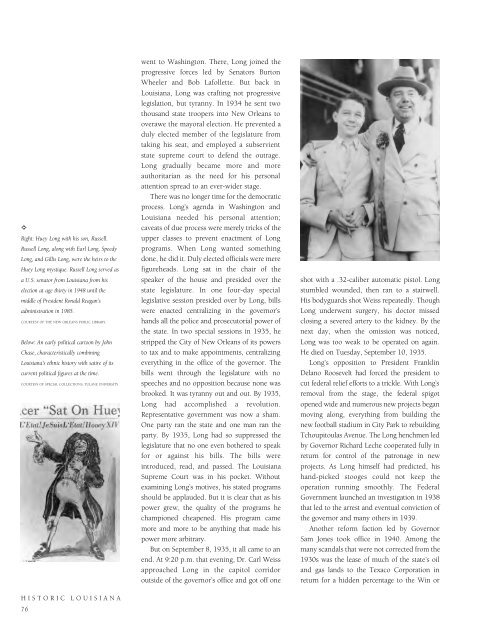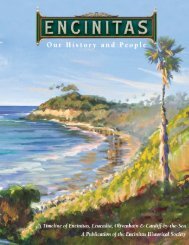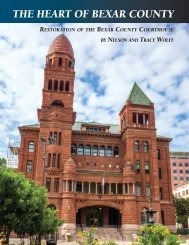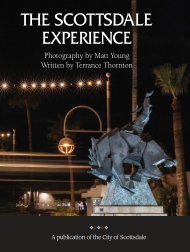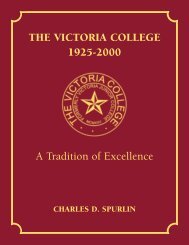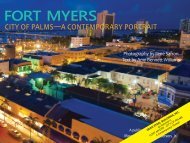Historic Louisiana
An illustrated history of Louisiana, paired with the histories of companies, families and organizations that make the state great.
An illustrated history of Louisiana, paired with the histories of companies, families and organizations that make the state great.
You also want an ePaper? Increase the reach of your titles
YUMPU automatically turns print PDFs into web optimized ePapers that Google loves.
✧<br />
Right: Huey Long with his son, Russell.<br />
Russell Long, along with Earl Long, Speedy<br />
Long, and Gillis Long, were the heirs to the<br />
Huey Long mystique. Russell Long served as<br />
a U.S. senator from <strong>Louisiana</strong> from his<br />
election at age thirty in 1948 until the<br />
middle of President Ronald Reagan’s<br />
administration in 1985.<br />
COURTESY OF THE NEW ORLEANS PUBLIC LIBRARY.<br />
Below: An early political cartoon by John<br />
Chase, characteristically combining<br />
<strong>Louisiana</strong>’s ethnic history with satire of its<br />
current political figures at the time.<br />
COURTESY OF SPECIAL COLLECTIONS, TULANE UNIVERSITY.<br />
HISTORIC LOUISIANA<br />
76<br />
went to Washington. There, Long joined the<br />
progressive forces led by Senators Burton<br />
Wheeler and Bob Lafollette. But back in<br />
<strong>Louisiana</strong>, Long was crafting not progressive<br />
legislation, but tyranny. In 1934 he sent two<br />
thousand state troopers into New Orleans to<br />
overawe the mayoral election. He prevented a<br />
duly elected member of the legislature from<br />
taking his seat, and employed a subservient<br />
state supreme court to defend the outrage.<br />
Long gradually became more and more<br />
authoritarian as the need for his personal<br />
attention spread to an ever-wider stage.<br />
There was no longer time for the democratic<br />
process. Long’s agenda in Washington and<br />
<strong>Louisiana</strong> needed his personal attention;<br />
caveats of due process were merely tricks of the<br />
upper classes to prevent enactment of Long<br />
programs. When Long wanted something<br />
done, he did it. Duly elected officials were mere<br />
figureheads. Long sat in the chair of the<br />
speaker of the house and presided over the<br />
state legislature. In one four-day special<br />
legislative session presided over by Long, bills<br />
were enacted centralizing in the governor’s<br />
hands all the police and prosecutorial power of<br />
the state. In two special sessions in 1935, he<br />
stripped the City of New Orleans of its powers<br />
to tax and to make appointments, centralizing<br />
everything in the office of the governor. The<br />
bills went through the legislature with no<br />
speeches and no opposition because none was<br />
brooked. It was tyranny out and out. By 1935,<br />
Long had accomplished a revolution.<br />
Representative government was now a sham.<br />
One party ran the state and one man ran the<br />
party. By 1935, Long had so suppressed the<br />
legislature that no one even bothered to speak<br />
for or against his bills. The bills were<br />
introduced, read, and passed. The <strong>Louisiana</strong><br />
Supreme Court was in his pocket. Without<br />
examining Long’s motives, his stated programs<br />
should be applauded. But it is clear that as his<br />
power grew, the quality of the programs he<br />
championed cheapened. His program came<br />
more and more to be anything that made his<br />
power more arbitrary.<br />
But on September 8, 1935, it all came to an<br />
end. At 9:20 p.m. that evening, Dr. Carl Weiss<br />
approached Long in the capitol corridor<br />
outside of the governor’s office and got off one<br />
shot with a .32-caliber automatic pistol. Long<br />
stumbled wounded, then ran to a stairwell.<br />
His bodyguards shot Weiss repeatedly. Though<br />
Long underwent surgery, his doctor missed<br />
closing a severed artery to the kidney. By the<br />
next day, when the omission was noticed,<br />
Long was too weak to be operated on again.<br />
He died on Tuesday, September 10, 1935.<br />
Long’s opposition to President Franklin<br />
Delano Roosevelt had forced the president to<br />
cut federal relief efforts to a trickle. With Long’s<br />
removal from the stage, the federal spigot<br />
opened wide and numerous new projects began<br />
moving along, everything from building the<br />
new football stadium in City Park to rebuilding<br />
Tchoupitoulas Avenue. The Long henchmen led<br />
by Governor Richard Leche cooperated fully in<br />
return for control of the patronage in new<br />
projects. As Long himself had predicted, his<br />
hand-picked stooges could not keep the<br />
operation running smoothly. The Federal<br />
Government launched an investigation in 1938<br />
that led to the arrest and eventual conviction of<br />
the governor and many others in 1939.<br />
Another reform faction led by Governor<br />
Sam Jones took office in 1940. Among the<br />
many scandals that were not corrected from the<br />
1930s was the lease of much of the state’s oil<br />
and gas lands to the Texaco Corporation in<br />
return for a hidden percentage to the Win or


